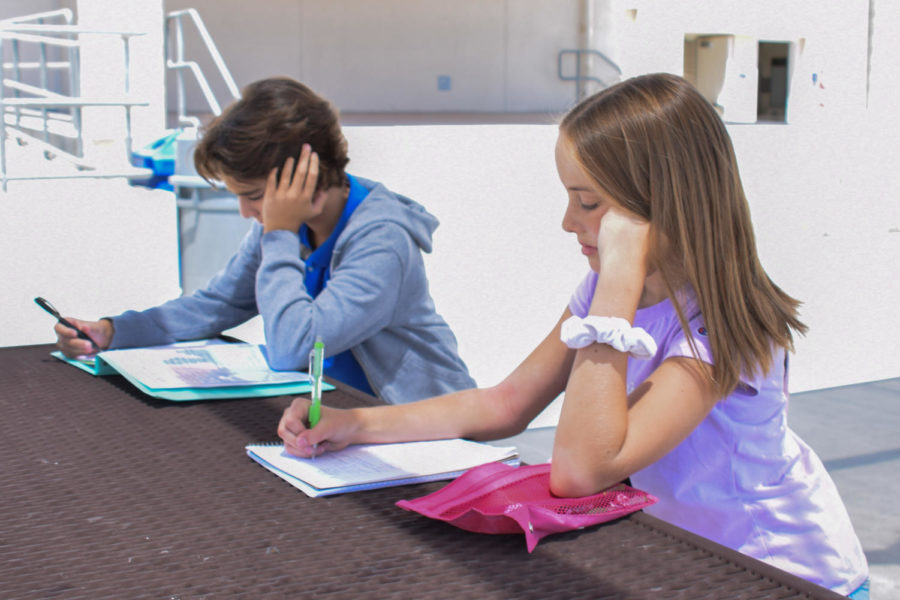Homework: Necessity or Not
Many students see homework as a bad thing, but is it really?
August 22, 2019
Mrs. Vanesa Gonsales, Day Creek’s Child Care Coordinator and also the proud mother of a DCIS sixth grader, watches her son check the answers to his homework problems, sitting amongst other child care students at a cluttered table. It is littered with multiple books, journals, writing utensils, and worksheets, as well as a few scattered Chromebooks. She realizes how long it takes her students to complete an assignment, and wonders if homework is really needed.
“My son in 6th grade goes to bed at 8 or 9 PM, but after taking care of other students, I recommend giving less homework,” Mrs. Gonsales said.
Homework is something that few schools go without, and most students complain that it takes away from their free time after school hours, leaving school staff to wonder if they should continue this age-old practice. A Brookings report on homework in America stated, “Just the word itself, sparks controversy.”
According to a 2006 study conducted by Dr. Harris Cooper at Duke University, “[Opponents of homework] argue it can lead to boredom with schoolwork, since all activities remain interesting for only so long.” Some students have shorter attention spans, which prevents them from focusing at such a young age.
A parent can also interfere too much with a child’s assignments, causing him to have a biased response which was affected by parental opinion. “Parents can get too involved in homework– pressuring their child and confusing him by using different instructional techniques than the teacher,” said Cooper.
Students believe they need a break after a long day of school. “I think we do get too much homework because we already have to do a lot of work in class and I think that just adds on to all of those things,” seventh grader Ethan L. said.
Some also argue that homework robs students of necessary sleep, causing them to work late into the evening to complete their assignments. In the article “My Daughter’s Homework is Killing Me,” the author said, “ Some evenings, when we force her to go to bed, she will pretend to go to sleep and then get back up and continue to do homework for another hour. The following mornings are awful, my daughter teary-eyed and exhausted but still trudging to school.”
Sleep deprivation in tweens and teens here in the United States is a significant issue, found in almost 90% of teenagers. Children are missing out on a full night of sleep, necessary for school the next day. The article “Homework Vs. Sleep” by Craig Canapari states that students who have excessive amounts of homework are frequently staying up late just to wrap things up. “The combination of heavy homework loads and early school start times is a major cause of sleep deprivation in teens,” Canapari explained.
Although many students voice their frustration with their homework load, teachers continue to assign repetitive busywork. So the real question is, how is homework beneficial?
“I think I give (students) the amount of homework required to practice in school,” Seventh grade teacher Mrs. Dye said, “so that they’re successful on their quizzes and tests and they have the material to learn.”
Studies have demonstrated that homework is important for kids, showing that there is a relationship between homework and quiz or test scores. Life skills can be established, such as time management and organization. Homework also requires good study habits that can be utilized in and out of the classroom or later in academia. It allows students to recognize that learning is a universal action that can happen anytime, helping kids to recognize that learning is limited to the classroom.
“You need to keep practicing at home if you do not understand an assignment,” Amira H. said. “If you don’t practice what you need help with, you won’t learn.”
According to Dr. Cooper’s study, middle school students should be spending about 90 minutes on their homework. Less time is needed for elementary students, while high schoolers can endure more. “These recommendations are consistent with the conclusions reached by our analysis. Practice assignments do improve scores on class tests and grades,” says Dr. Cooper.






